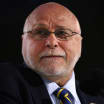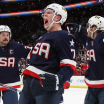Chara, at 42, remains vital cog for Bruins in run to Stanley Cup Final
Defenseman faces Blues seeking second championship, building leadership legacy

When he joined the Boston Bruins from the Ottawa Senators, a prized free agent and the newly installed captain of a group he had just met, he was a bit stunned by what he found.
"I remember that, 2006," he said, in a one-on-one interview with NHL.com this week. "It was so different. It was so different. I was like, I have to make this work. But it was not easy. 2006. That's a long time ago."
RELATED: [Complete Bruins vs. Blues series coverage]
He had just turned 29, with eight years in the NHL behind him, in the midst of a run of greatness that would see him win one Norris Trophy and be named a finalist six times, most recently in 2014. But he quickly recognized that his new team would need more from him than on-ice excellence.
Having arrived in Boston alongside fellow new signee Marc Savard, he knew he needed to introduce sweeping changes. He knew he needed to alter a team culture that wasn't what he had envisioned.
Now, 13 years later, with two Stanley Cup Finals and one Stanley Cup championship under his belt, and with his third Cup Final as captain about to begin on Monday at TD Garden against the St. Louis Blues (8 p.m. ET; NBC, CBC, SN, TVAS), he believes in what he has brought to Boston.
He believes it will outlast him, whenever he finally stops playing the game.
"That's ultimately the goal," he said. "As a parent -- you want to do that, to hand off your experiences, your heart, your soul, to them, and hopefully you'll see them one day become what you envisioned. That's obviously a goal for me, to see these younger players one day become -- step up on that platform, being a leader, and set their standards for the next generation and lead and win.
"It will make me happy because you see that little sadness that you are maybe not part of it anymore, but proud moment because I think I have a little, maybe, to do with it."
E.J. Hradek, Dan Rosen preview the Stanley Cup Final
That is as close as the 42-year-old will come to talking about a future in which he is no longer playing in the NHL, though he has contemplated the prospect, calling up other players -- Mark Recchi, Nicklas Lidstrom, Jaromir Jagr -- in seasons past to talk about their thoughts on retirement.
He is signed for next season, on a one-year contract, and makes it clear that he intends to honor that commitment, even if he finishes this season holding the Stanley Cup aloft for the second time. Citing an obligation to the team, he said he has no plans to win and retire, as former teammate Recchi did in 2011 after the Bruins beat the Vancouver Canucks.
But that doesn't mean that Chara has not considered his legacy.
He knows that he will not win another Norris, though he can't help but joke about it.
"Maybe I will," he said, seriously, before cracking a smile.
"Just kidding. Trust me, it's not going to happen. I had my run."
But just because he can no longer be considered the best defenseman in the NHL, that doesn't mean he can't add to what could be a Hall of Fame career. Another Stanley Cup win would help.
It's not just that, though. It's the changes he's made, the culture he's instituted, the players he's helped raise, just as he has raised his daughter and twin sons.
"You will not take credit for it, but you will be like, this is pretty cool because I remember that kid when he was 18. Now he's 27 and a leader and he's doing this," Chara said. "You want to be remembered a certain way. I think that's very important, what you're going to be remembered for, what's your legacy, what you left after [you retire]."
Under Chara, the worth ethic has been increased, including the offseason and training regimens, the word "rookie" has been eliminated from the locker room, the communication strategy has been modified and improved. The team has become close, welcoming, open.
That will be reflected in the players that are still on the Bruins, in center Patrice Bergeron, in center David Krejci, in defenseman Charlie McAvoy. The players who were so young when they first encountered Chara, who grew up under his leadership, who assumed bigger roles of their own.
"He's someone you want to model yourself after, just with the way he does everything, not just on the ice but off the ice," McAvoy said. "[I've learned] a ton. More than I can explain, really."
Home ice gives Bruins advantage in Stanley Cup Final
It has been notable that, in recent seasons, Chara has loosened his iron grip slightly on the captaincy, allowing Bergeron -- his heir apparent -- to take on even more of a role, to lead by his side, opening space not just for those who don't necessarily respond to Chara's brand of intensity, but also for a future in which he will melt into the team's history books rather than its present.
"I think once I got to the position where I was able to become a leader, the leader, I really wanted to lead by certain standards that I had in me and early on I knew it was not probably pleasant for some guys or some type of players," Chara said. "But I wanted to do it my way and the way that I believed in, and that was really hard work, discipline, desire and dedication.
"You have to buy in and be part of the team and what the team is all about and what we created as an identity. I had such a privilege to have such great teammates that they follow, they were willing to go that same road and they said, yes, we will do that and it paid off. Patrice is a great example."
When Chara arrived in Boston, Bergeron had played two seasons in the NHL, showing a maturity and talent above his 21 years. The center had come to the team barely speaking English, but was someone the Bruins had high hopes for, someone who was considered as a future cornerstone, a factor in the team trading away Joe Thornton.
"He was just a kid, just a tiny kid, but look at him now," Chara said. "I'm so proud of what he's done and how he became someone that I can always rely on too, and we became such a good duo, working with the team and teammates."
It's something Bruce Cassidy picked up on immediately when he was named coach after the Bruins fired Claude Julien on Feb. 7, 2017.
"I think this leadership group is second to none," Cassidy said. "I don't know if I'll ever have -- wherever this career takes me -- a group like this to work with. I've said that since probably the second week on the job here, that those guys are fantastic, and they sure make a coach's job a lot easier."
It's something that players comment on when they arrive from other teams. It's something their families note. They see something that they haven't seen before, with other franchises. They see a culture that is a revelation. They see a tight-knit group that is modeled after players who will be remembered for their leadership as much as for their exploits on the ice.
But there are still those exploits on the ice to contend with. Just because Chara is 42, just because his minutes have dipped and his role on the defense is not what it once was, doesn't mean that his play doesn't have an effect. He remains a top-pair defenseman, the perfect complement to McAvoy, a player difficult to contend with and difficult to avoid.
And that is what also makes this run meaningful. Chara is not just a figurehead on a team that has reached the Stanley Cup Final. He is a crucial piece.
"It is remarkable," said general manager Don Sweeney, who played as a defenseman in the NHL until he was 37. "[Chara's] a proud, stubborn, driven [player] -- all the reasons that he's as successful as he is. … It's incredible that he's doing it. I know he looks at other athletes and what they're able to accomplish and taps into those resources as well, so he's the guy that's continued to evolve over a long, long period of time. It's a testament to him and we're thankful he's in our organization."
They're thankful he's here now, as they arrive at the Stanley Cup Final. But they will be thankful, too, in years to come, when they see the fruits of what he's planted, when they see the culture endure. It has not always been easy for Chara, coming in, making changes, going up against players - as he admitted - who were not quite as enthusiastic as he was.
But he sees his vision playing out. He sees his teammates, sometimes as a proud parent. He sees what will still be here when he is not. And it humbles him, as much as it lifts him up and sustains him.
"You know, I'm proud of it," Chara said,"That this became something people will probably look back and say, OK, that's what's been created and the seed was planted when Zee came and changed the look of the franchise."

















